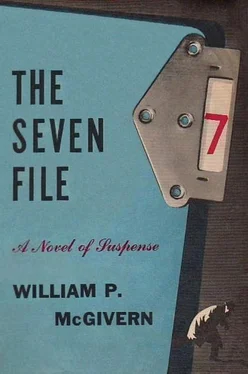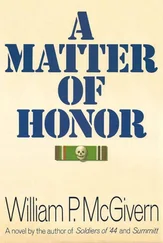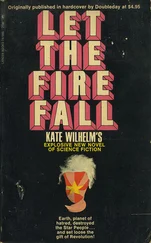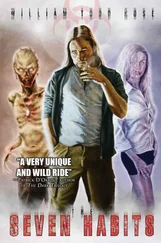“It’s a stupid song,” Duke said. “A whining old dirge.” His voice was harder now, arrogant and challenging. Hank looked at him and shrugged lightly. “You don’t want me to play it?”
“Why should I give a damn? Play whatever the hell you want.” He limped back to the mantel to refill his glass.
Hank began picking out the song again and Duke wandered back to the window and stared out at the night. Belle came out of the kitchen a moment or so later and drifted over to the piano. “That’s nice,” she said.
“Sing it,” Hank said.
“You asked for it, mister.” She began to hum the song softly in a low and surprisingly pleasant voice. “It’s so dreamy and sad,” she said at last. “I just love it. Let’s see if I can remember the words.”
“Knock it off,” Grant said irritably. “That’s all we need, campfire songs.”
“Let her sing if she wants to,” Duke said. He didn’t turn around but they could hear the anger in his voice. “She can sing if she wants to.”
“Okay, okay,” Grant said. “But does she have to stick to that cornball Mick song?”
“What do you know about music?” Duke said, turning and staring at him. “You never heard anything but an organ grinder in that Polack neighborhood you grew up in.”
“A lot of big men came out of that neighborhood, and don’t forget it,” Grant said.
“But not including you,” Duke said.
“What’s the matter? You want Belle to sing Irish songs? Fine! Great! She can sing Mother Machree and Paddy McGinty’s Goat until dawn for all I care.” He returned pointedly to his newspaper. “Just let me know when it’s over so I can clap.”
Hank smiled at Belle, and she began singing again, slowly and shyly; her eyes switched to Grant for some sign of interest or approval, but he was buried in the paper.
“You’re doing fine,” Hank said. He glanced at Duke and saw that he put his drink on the windowsill and was rubbing his forehead with both hands. The music was a thin lament in the silence and Belle’s voice as soft and sad as a weeping child’s. “You’re doing fine,” Hank said again, and she gave him a grateful and nervous little smile.
Hank looked at Duke again, seeing the crack in him now. But where was the wedge to fit into it? And the hammer to drive it home?
Mail was delivered around eight-fifteen on Thirty-first Street, but at seven o’clock Crowley and the Bradleys were waiting in the living room for the postman. If things were as they hoped, the morning’s mail would bring the instructions for paying the ransom money — the last step before the return of the baby.
Crowley stood at the front window with his binoculars trained on the building across the street. The watcher was there, he saw, a dark outline behind the heavy curtains. Creasy, Howard Creasy. A neatly dressed little man who hadn’t had a job for four months. And who spent a great deal of his time watching the Bradleys’ home. Crowley had got another name from West: Duke Farrel, the man who had posed as a telephone repairman. So far they had only the names — but now a hundred agents were on the trail.
Ellie Bradley was pacing the floor slowly. She wore a dressing gown and slippers. Mrs. Jarrod had brought in a tray of coffee, but after one sip Ellie had put her cup down on the mantel. Dick Bradley was watching the front door and his father sat on the sofa, nervously sucking on a dry pipe.
No one made any attempt at conversation; small talk or banalities would have fallen grotesquely into the silence.
When the chimes sounded they were all caught by surprise; they weren’t expecting the mail for another hour. Oliphant Bradley stood quickly, his breathing loud and heavy in the stillness. Dick Bradley looked helplessly from his wife to Crowley.
“See who it is,” Crowley said.
“Yes — yes, of course.” Dick hurried down the short hallway and opened the door. A postman stood on the door step. “Special, sir,” he said.
“Thank you.”
“Going to be a nice day, eh? So long.”
Bradley returned to the living room and said, “We didn’t think about special deliveries.” His voice was high and breathless. He fumbled at the envelope for a few seconds, and then shook his head and handed the letter to Crowley. “You open it. I–I can’t seen to manage.”
Crowley opened the letter and removed the single sheet of lined, copybook paper. It had been folded twice, and as he opened it he saw that it had been tom from a pad or tablet; the left side of the paper was ragged and uneven.
Ellie walked toward him slowly, her hands pressed tightly against her breasts. “What do they want us to do?”
Crowley was staring at the note and she saw the frown gathering above his eyes.
“What is it?” she said. “What is it?” Her voice was beginning to shake.
Each word in the note struck Crowley with a sickening impact; where did we slip? he thought despairingly. For the note, in neatly penciled capitals, read; You didn’t follow instructions, chickies! So you don’t want her back, after all.
Dick Bradley took the note from his hands. “What’s the matter? What do they—” He stopped then, as abruptly as if his words had struck a physical barrier. “God!” he said. “They know the police are in it.” His face was suddenly white and old as he stared at his wife. “It’s all over,” he said in a high, terrible voice. “It’s over.”
“This kind of letter is standard,” Crowley said. “At this stage they want to keep you scared. If you’ve been thinking of going to the police, this will stop you.” No one was listening to him, and he hadn’t expected them to; he hoped only that the sound of his voice might distract them for a second or so — give them an instant to adjust to this new terror. He hadn’t lied to them; a bluffing note might come in about this time. But they wouldn’t believe that. And, in this case, neither did he...
Ellie sat down very slowly. “They’ve killed her, I know. She’s dead.” The lack of emotion in her voice was more shocking than any outburst; she sounded as if she were discussing the weather. And her eyes were empty and dry.
Dick Bradley was staring straight at his father. “They didn’t kill her,” he said quietly, almost thoughtfully.
“Son—”
“We didn’t want the police. We wanted to pay the money and get Jill back safely. But you knew better. You called the police.”
“Son, listen to me. I swear I thought—”
“It doesn’t matter what you thought. What matters is that out daughter is dead. That’s what you’ve done.”
“No, no,” Ellie said, shaking her head. “Don’t say that, Dick. Please.”
“Ellie—” The old man sat down beside her and his lips were trembling helplessly. “I did — what I thought was best for our baby. You must believe me. I don’t want forgiveness. I don’t deserve it.” His voice was shaking. “But you must believe me, Ellie.”
“I do, I do, of course I do,” she said in a soothing voice.
Crowley felt a dry pain in his throat. She was making it easy for him, for all of them.
“Dick, bring us a drink, please,” she said. “I think your father might have a brandy.” She looked at his white face, the little circle of pain around his lips. “Then you’d better lie down for a while. There’s nothing — more to do now.”
And it was then, as Dick Bradley left the room, that the chimes sounded for the second time. Ellie stood up quickly, a hand moving to her throat, and Crowley said, “Could you go to the door?”
“Yes, I’m all right, I can manage.”
He looked at her steadily for a second or so, and then said, “You could manage anything, for my money.”
Читать дальше











